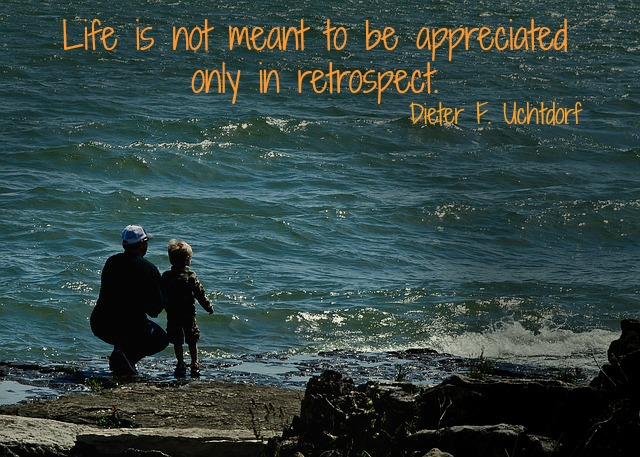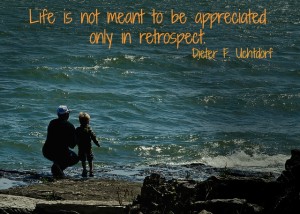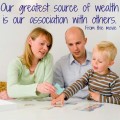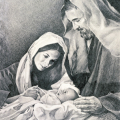Two years ago, near the 39th anniversary of Roe v. Wade—the landmark U.S. Supreme Court decision legalizing abortion—I was checking into the hospital to undergo a procedure commonly performed to end the life of a fetus. But I wasn’t ending my child’s life, he had already passed away. He didn’t make it past the first trimester. As I sat emotionally numb, waiting once again for this dreaded procedure, I couldn’t imagine choosing to undergo this procedure to end the life of my unborn child. I was brokenhearted at the loss, and I knew it would be physically, emotionally and spiritually draining.
For some, Roe v. Wade is a victory for women’s rights to fulfill their dreams, pursue their careers and not be “burdened” by the responsibilities of children. For members of The Church of Jesus Christ of Latter-day Saints (sometimes inadvertently called the Mormon Church), it is denying these spirits their birthright—the right to be born into the world. For me, it is an unimaginable betrayal of our unborn children. It was difficult enough for me to endure this procedure knowing that my unborn babies did not survive. But I can’t fathom electing this procedure on the chance my child could have survived. Elder Russell M. Nelson, a member of the Quorum of the Twelve Apostles (with the First Presidency, the governing body of The Church of Jesus Christ), said:
… Society professes reverence for human life. We weep for those who die, pray and work for those whose lives are in jeopardy. For years I have labored with other doctors here and abroad, struggling to prolong life. It is impossible to describe the grief a physician feels when the life of a patient is lost. Can anyone imagine how we feel when life is destroyed at its roots, as though it were a thing of naught?
What sense of inconsistency can allow people to grieve for their dead, yet be calloused to this baleful war being waged on life at the time of its silent development? What logic would encourage efforts to preserve the life of a critically ill twelve-week-old infant, but countenance the termination of another life twelve weeks after inception? More attention is seemingly focused on the fate of a life at some penitentiary’s death row than on the millions totally deprived of life’s opportunity through such odious carnage before birth. [1]
Birth is Part of God’s Plan for His Children
Life does not begin at birth, and it does not end at death. We lived as spirit children of our Heavenly Father before we were born. After we die, our spirits and our bodies will separate—but our spirits will live on. Eventually our bodies and our spirits will be reunited—which is called resurrection. Elder L. Tom Perry, an Apostle of Jesus Christ, said:
Many people wonder, “Where did we come from? Why are we here? Where are we going?” Our Eternal Father did not send us to earth on an aimless, meaningless journey. He provided for us a plan to follow. He is the author of that plan. It is designed for man’s progress and ultimate salvation and exaltation….
We first heard about the plan of salvation before we were born, in what the scriptures call our first estate (see Abraham 3:26). What occurred in this first estate is dimly understood, but we do know that we lived there as spirits, children of our Heavenly Father, and we made certain steps of advancement to prepare for the opportunity of housing our eternal spirits in earthly bodies. We also know that our Father held a great council to explain the purpose of earth life. We had the opportunity of accepting or rejecting the plan of salvation. It was not forced upon us. The essence of the plan was that man would have an opportunity of working out his own salvation on earth, with God’s help. A leader was selected to teach us how to follow the plan and to redeem us from sin and death. As the Lord explained to Moses, “Behold, my Beloved Son, which was my Beloved and Chosen from the beginning, said unto me—Father, thy will be done, and the glory be thine forever” (Moses 4:2).
Jesus Christ, our Elder Brother, became the leader in advocating the plan designed by the Father, and we accepted the plan and its conditions. With that choice we earned the right to come to earth and enter our second estate. [2]
The second estate, then, is our time on earth and is called “mortality,” or our mortal life. Elder Perry continued:
There are two purposes for life in mortality. The first is that we might gain experiences that we could not obtain in any other way. The second is to obtain tabernacles of flesh and bones. Both of these purposes are vital to the existence of man. We are now being tried and tested to see if we will do all the things the Lord has commanded us to do. These commandments are the principles and ordinances of the gospel, and they constitute the gospel of Jesus Christ. Every principle and ordinance has a bearing upon the whole purpose of our testing, which is to prepare us to return to our Heavenly Father and become more like Him. [2]
So we came to earth to obtain a body and gain experiences with that body. But the plan doesn’t end there. Our loving Heavenly Father knew that we would make mistakes, which would further separate us from Him. Elder Perry taught:
All of this is made possible by Jesus Christ. He is the centerpiece of the eternal plan of the Father, the Savior who was provided as a ransom for mankind. God sent His Beloved Son to overcome the Fall of Adam and Eve. He came to earth as our Savior and Redeemer. He overcame the obstacle of physical death for us by giving up His own life. When He died on the cross, His spirit became separated from His body. On the third day His spirit and His body were reunited eternally, never to be separated again.
Life on earth is of limited duration. There comes a time for all of us when the spirit and the body are separated in death. But because of the Resurrection of Jesus Christ, we will all be resurrected, regardless of whether we have accomplished good or evil in this life. Immortality is the gift to every mortal child of our Father in Heaven. Death must be viewed as a portal to a new and better life. Through the glorious resurrection, body and spirit will be reunited. We will have a perfect, immortal body of flesh and bones that will never be subjected to pain or death. But the glory we attain to in the next life will depend on our performance in this life. Only through the gift of the Atonement and our obedience to the gospel can we return and live with God once again. [2]
Life is ‘Meaningful’ for All of Us
We are all children of our Heavenly Father, and He loves each and every one. We all have special, unique characteristics and personalities that we have had since before we came to this earth. We were individuals, and God loves us individually. Elder Nelson—an Apostle of Jesus Christ who is a physician by trade—said:
Nearly all legislation pertaining to abortion considers the duration of gestation. The human mind has presumed to determine when “meaningful life” begins. In the course of my studies as a medical doctor, I learned that a new life begins when two special cells unite to become one cell, bringing together 23 chromosomes from the father and 23 from the mother. These chromosomes contain thousands of genes. In a marvelous process involving a combination of genetic coding by which all the basic human characteristics of the unborn person are established, a new DNA complex is formed. A continuum of growth results in a new human being. Approximately 22 days after the two cells have united, a little heart begins to beat. At 26 days the circulation of blood begins. To legislate when a developing life is considered “meaningful” is presumptive and quite arbitrary, in my opinion. [3]
I have had many sacred experiences that have taught me that “meaningful life” begins at conception. When I was pregnant with each of my four children, I would communicate with them. I would talk and they would respond—spirit to spirit. There were never any words said on their part, just a feeling. My third pregnancy, I was sure he was a boy named Atticus. So when I talked, I talked to Atticus. But he never responded. And I found out why. When I had the ultrasound where we found out the gender, we discovered she was a girl. And she was Juliet. Once I started talking to Juliet, she would communicate back. But only after I called her by the correct name. One of the times I miscarried, I knew before I even took the pregnancy test that it would be positive because I could feel a little spirit with me. It was a very sacred and special experience. I could feel when he was there, and I could feel when he was gone. Elder Nelson tells another story that is cause for serious reflection:
Consider another individual weighing the consequences of her pregnancy. She was beyond the normal age for bearing children. She announced to her doctor that her husband was an alcoholic with a syphilitic infection. One of her children had been born dead. Another child was blind. Another had tuberculosis. Her family had a history of deafness. Finally she confessed that she was living in abject poverty. If this true historical situation were posed today, many would recommend abortion. The child born from that pregnancy became the renowned composer Ludwig van Beethoven. [1]
Right to Choose
Much has been made of a woman’s “right to choose.” But as I tell my children, you can always choose the action, but you can’t always choose the consequences. Of this, Elder Nelson said:
Elective abortion has been legalized in many countries on the premise that a woman is free to choose what she does with her own body. To an extent this is true for each of us, male or female. We are free to think. We are free to plan. And we are free to do. But once an action has been taken, we are never free from its consequences.
To understand this concept more clearly, we can learn from the astronaut. Anytime during selection or preparation, he or she is free to withdraw from the program. But once the spacecraft has lifted off, the astronaut is bound to the consequences of the previous choice to make the journey.
So it is with people who choose to embark on a journey that leads to parenthood. They have freedom of choice—to begin or not to begin that course. When conception does occur, that choice has already been made. … Her choice to begin the journey binds her to the consequences of that choice. She cannot “unchoose.” [3]
Once on the course, a woman’s choices no longer only concern herself. She is now responsible for the life of her unborn child. Elder Nelson said:
When the controversies about abortion are debated, “individual right of choice” is invoked as though it were the one supreme virtue. That could only be true if but one person were involved. The rights of any one individual do not allow the rights of another individual to be abused. In or out of marriage, abortion is not solely an individual matter. Terminating the life of a developing baby involves two individuals with separate bodies, brains, and hearts. A woman’s choice for her own body does not include the right to deprive her baby of life—and a lifetime of choices that her child would make. [3]
Depriving a child of life often has another consequence: It deprives a prospective adoptive couple the opportunity to bring a child into their family. There are happily married couples who, for one reason or another, are unable to have children of their own. Elder Nelson counseled:
Why destroy a life that could bring great joy to others? There are better ways of dealing with an unwanted pregnancy. …Adoption is a wonderful alternative to abortion. Both the baby and the adoptive parents can be greatly blessed by the adoption of that baby into a home where the child will be lovingly nurtured…. [3]
My husband and I have seen firsthand the joy that comes from adoption—for the children and the parents. It is a beautiful gift for all involved.
We Can’t Lose Sight of Who We Are In God’s Eyes
In the world we live in today, we need to remember that we matter to our Heavenly Father—we are His children. But sometimes we can get too puffed up and forget that we are not alone in the world. Sometimes we can get too caught up in ourselves, in our own lives and in our own desires that we lose sight of what is really important. One writer commented:
… By misjudging our place in the world, we invariably begin to careen into others, and the sin of pride corrupts all that we do. How would our lives be different if we understood that we are never more important than our spouse? We are never more important than our children? We are never more important than our neighbor or brother? [4]
If we misjudge our place in the world, we may end up with regrets at the end of our lives. President Dieter F. Uchtdorf, the second counselor in the First Presidency of The Church of Jesus Christ, said:
Another regret people expressed was that they failed to become the person they felt they could and should have been. When they looked back on their lives, they realized that they never lived up to their potential…. I am not speaking here of climbing the ladder of success in our various professions. That ladder, no matter how lofty it may appear on this earth, barely amounts to a single step in the great eternal journey awaiting us. …
Our Heavenly Father sees our real potential. He knows things about us that we do not know ourselves. He prompts us during our lifetime to fulfill the measure of our creation, to live a good life, and to return to His presence. Why, then, do we devote so much of our time and energy to things that are so fleeting, so inconsequential, and so superficial? Do we refuse to see the folly in the pursuit of the trivial and transient? [5]
When we can’t see the grand, eternal picture, we can get lost in the here and now. President Thomas S. Monson, the president of The Church of Jesus Christ, offered this counsel:
We become so caught up in the busyness of our lives. Were we to step back, however, and take a good look at what we’re doing, we may find that we have immersed ourselves in the “thick of thin things.” In other words, too often we spend most of our time taking care of the things which do not really matter much at all in the grand scheme of things, neglecting those more important causes. [6]
Those most important causes, for me, are my family: my husband and children. Motherhood isn’t restrictive, limiting or a burden—it is a gift that I cherish. Children are our greatest assets, and we see ourselves through them. At least I see myself through them. I thought I was something until I had children—and I realized just how flawed I was. Sometimes I see the need to change through my children’s behavior and actions. Sometimes I see what I’m doing right. But always I know now that I am a better person because of my husband and children.







I enjoyed reading this page. God Bless.